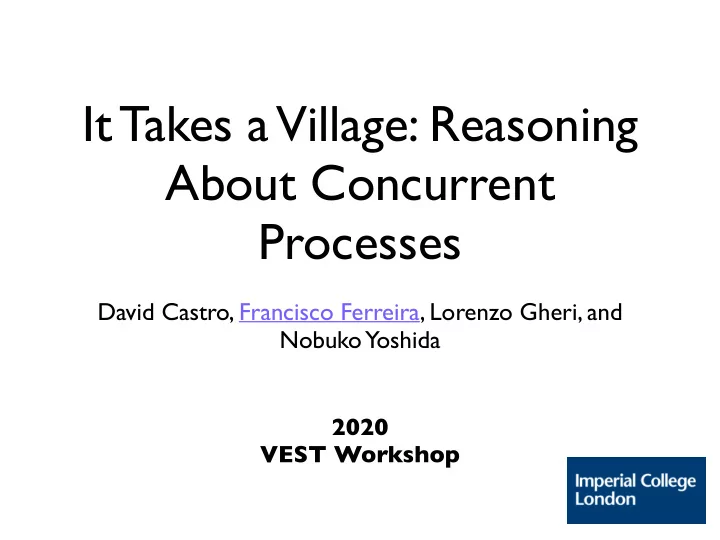

It Takes a Village: Reasoning About Concurrent Processes David Castro, Francisco Ferreira, Lorenzo Gheri, and Nobuko Yoshida 2020 VEST Workshop
Motivating Meta-Theory Certified tool + reasoning environment Certified code Reasoning extraction Mechanised Meta-theory
Binary Session Types • Do a case study: • Language Primitives and Type Discipline for Structured Communication-Based Programming Revisited, by Yoshida and Vasconcelos, 2007.
The send receive system and its cousin the revisited system.
What do we have? • A proof of type preservation formalised in Coq using ssreflect . • A library to implement locally nameless with multiple name scopes and handle environments in a versatile way. • TACAS 2020 accepter paper and artefact describing our 😄 tool and mechanisation. • We built in-team expertise (i.e. we learned some hard lessons while struggling to finish the proof).
What did we mechanise?
A tale of three systems • We set out to represent the three systems described in the paper: • The Honda, Vasconcelos, Kubo system from ESOP’98 • Its naïve but ultimately unsound extension • Its revised system inspired by Gay and Hole in Acta Informatica
The Send Receive System P ::= request a ( k ) in P session request | accept a ( k ) in P session acceptance We consider terms | k ![˜ e ]; P data sending up-to α -conversion | k ?(˜ x ) in P data reception | k ✁ l ; P label selection | k ✄ { l 1 : P 1 [ ] · · · [ ] l n : P n } label branching | throw k [ k ′ ]; P channel sending | catch k ( k ′ ) in P channel reception | if e then P else Q conditional branch | P | Q parallel composition Then we cannot distinguish: | inact inaction k?(x) in inact | ( ν u ) P name/channel hiding and | def D in P recursion k?(y) in inact e ˜ | X [˜ k ] process variables e ::= c constant | e + e ′ | e − e ′ | e × e | not ( e ) | . . . operators x 1 ˜ x n ˜ D ::= X 1 (˜ k 1 ) = P 1 and · · · and X n (˜ k n ) = P n declaration for recursion
α -conversion curse or Blessing? ( throw k [ k ′ ]; P 1 ) | ( catch k ( k ′ ) in P 2 ) → P 1 | P 2 • The original system depends crucially on names This is a bound variable. • If α -conversion is built in, this rule collapses to: ( throw k [ k ′ ]; P 1 ) | ( catch k ( k ′′ ) in P 2 ) → P 1 | P 2 [ k ′ /k ′′ ]
α -conversion curse or Blessing? • Humans have to pretend not to see the different bound names. • However, there exist several representations that offer inherently α -convertible terms: • de Bruijn indices (or levels) • Higher Order Abstract Syntax My personal take: α -conversion is more interesting that I originally • Locally Nameless gave it credit for.
The Naïve Representation • It “ looks like ” the original Send Receive system. • You start suspecting is wrong when defining the reduction relation. • You know there is a problem when the proof fails.
The Revisited system • Now we distinguish between the endpoints of channels. • It can be readily represented with LN-variables and names.
Four kinds of atoms
Typing environments • Store their assumptions in a unique order (easy to compare) • Only store unique assumptions (easy to split) • They come with many lemmas These are generic enough (less induction proofs) and easy to use. #artefact
Subject Reduction Theorem 3.3 (Subject Reduction) If Θ ; Γ ⊢ P ⊲ ∆ with ∆ balanced and P → ∗ Q , then Θ ; Γ ⊢ Q ⊲ ∆ ′ and ∆ ′ balanced. Is straightforward to represent:
We want more from our mechanisation.
Motivating Meta-Theory Certified Scribble Algorithms Certified tool + reasoning environment Certified code About Processes Reasoning Processes into OCaml extraction Mechanised MPST Trace equivalence Meta-theory
Processes : Local Types
Processes
“Process Traces are Nice” • Running a process preserves types by construction
From Processes to… Global Process Type Trace equivalent to Respect traces from Local Type
Reasoning • A process is a term of type Proc L. • The user just writes proofs on the shape of said term. • Processes are translated into monadic computations.
Extraction of certified code • Two aspects: • Generating certified OCaml code parametrised by an ambient monad. • Generating a certified library to handle Multiparty Session Types. Ultimately combining the 𝜉 Scr (a small implementation of Scribble in OCaml) to build Certified 𝜉 Scr.
Certified Processes
About Proof Assistant Choice • We chose Coq because it is powerful, well maintained, and popular in PL. • While using it, • I wished for Isabelle’s automation and classical logic. 😪 • I cried over the loss of Agda’s dependent pattern matching 😮 and rich interaction with the system. • As we try to get extraction to work, I envy Idris’s compiler. 🤥
If you want to know more… • Talk to us! • Binary Session types: • TACAS’20 Tool Paper: https://bit.ly/3co7KFn • Tech report: https://bit.ly/2ZZzAVE • EMTST repository: https://github.com/emtst/ • Multiparty Session Types Thanks for your kind attention! • Repo: Talk to us! Questions? • Check 𝜉 Scr at: https://nuscr.github.io
Recommend
More recommend